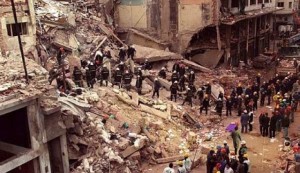 Argentina's foreign minister has insisted that an Argentine judge will question Iranian suspects over the deadly 1994 bombing of a Jewish charities building in Buenos Aires, despite an apparent Iranian refusal.
Argentina's foreign minister has insisted that an Argentine judge will question Iranian suspects over the deadly 1994 bombing of a Jewish charities building in Buenos Aires, despite an apparent Iranian refusal.
Hector Timerman gave the assurance to a Senate committee on Wednesday, a day after Iran's foreign ministry said assertions that former Iranian officials would be questioned were "a sheer lie".
"The Iranian foreign minister said that he is going to implement all the points that were agreed on in the memorandum of understanding, and that the accused will be questioned," Timerman told the Senate committee.
Iran "will comply with all points of the agreement," he added.
Timerman said that Iran had agreed in a memorandum of understanding to the questioning of eight Iranians wanted for the bombing.
The bombing at the Argentina-Israeli Mutual Association killed 85 people.
The eight suspects include Defence Minister Ahmad Vahidi, former president Akbar Hashemi Rafsanjani and ex-foreign minister Ali Akbar Velayati, who have had international arrests warrants out against them since 2006.
'Truth commission'
Iran has repeatedly denied involvement in the bombing, and has refused to arrest the suspects.
But last month, Argentina's President Cristina Kirchner announced an agreement with Iran to create an independent "truth commission" to investigate the bombing, and said it would clear the way for the Iranian suspects to be questioned by an Argentine judge.
Argentine Judge Rodolfo Canicoba Corral and prosecutor Alberto Nisman, the lead investigator, would go to Tehran to take the Iranians' testimony, according to Buenos Aires.
The negotiations have been sharply criticised by Israel and Argentina's 300,000-strong Jewish community, the largest in Latin America.
Both have demanded there be no let-up in the Argentine authorities' efforts to put the Iranian suspects on trial.
Israel's foreign ministry has protested against the agreement, while Washington has cast doubt that any solution will emerge from the deal.
By Aljazeera
The Iran Project is not responsible for the content of quoted articles.

 QR code
QR code